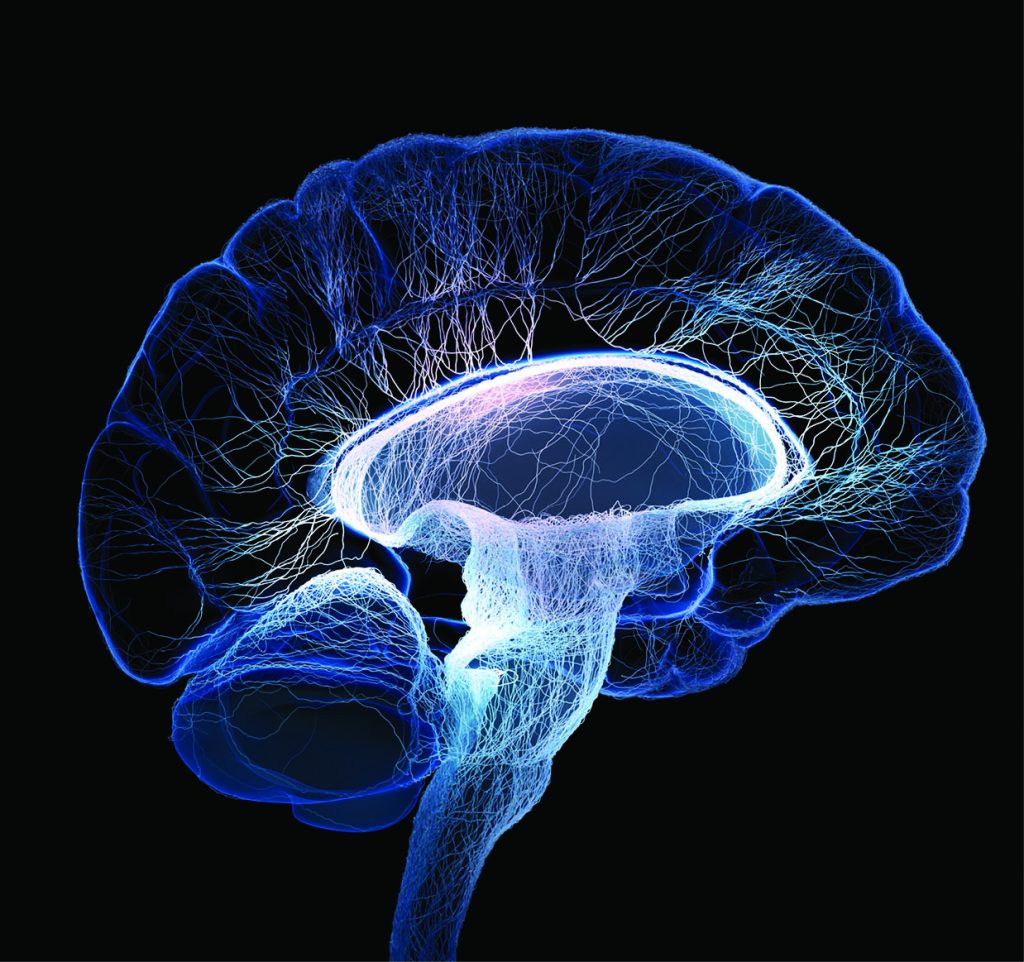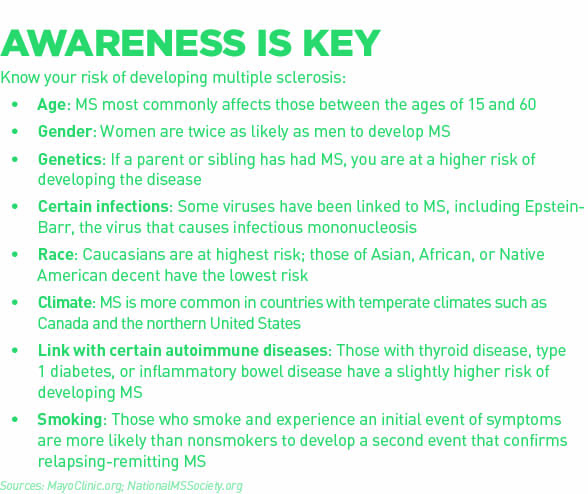How a diagnosis of multiple sclerosis can change your life
 It started with a tingling on her left side, like an electrical current coursing down her leg. Later she would step into the bath and not feel the hot water envelop her left leg as it nearly scalded her right. Walking across a cold floor would feel as though she had a sock on her left foot while both feet were bare. After multiple trips to a handful of specialists—Could it be lupus or Lyme disease or cancer?—finally Barb D. had a diagnosis: multiple sclerosis at age 51. “I was shocked,” she says.
It started with a tingling on her left side, like an electrical current coursing down her leg. Later she would step into the bath and not feel the hot water envelop her left leg as it nearly scalded her right. Walking across a cold floor would feel as though she had a sock on her left foot while both feet were bare. After multiple trips to a handful of specialists—Could it be lupus or Lyme disease or cancer?—finally Barb D. had a diagnosis: multiple sclerosis at age 51. “I was shocked,” she says.
More tests, including blood work, a spinal tap, and MRIs, would ensue over the next several months before a definitive diagnosis revealed Barb had relapsing-remitting MS. “My symptoms get worse and then improve, but they don’t progress,” she explains. Today, more than 10 years have passed since her diagnosis. “I assumed I’d be in a wheelchair or using a walker by now,” Barb says. Instead she’s retained full mobility—although she tires easily—thanks to thrice-weekly injections she does at home, coupled with a positive attitude and a dedicated support system, which includes her husband Bob, and her coworkers.
A Good Diagnosis
 According to the National Multiple Sclerosis Society, MS is an unpredictable, often disabling disease of the central nervous system that disrupts the flow of information within the brain and between the brain and body. While the cause remains unknown, scientists believe the disease is triggered by undetermined environmental factors in a person who is genetically predisposed to respond.
According to the National Multiple Sclerosis Society, MS is an unpredictable, often disabling disease of the central nervous system that disrupts the flow of information within the brain and between the brain and body. While the cause remains unknown, scientists believe the disease is triggered by undetermined environmental factors in a person who is genetically predisposed to respond.
There is no definitive blood test for MS, but blood tests can rule out other conditions that mimic the symptoms of MS, including Lyme disease, collagen-vascular diseases, certain rare hereditary disorders, and AIDS. Other tests—including MRIs, spinal taps to test the cerebrospinal fluid, and evoked potential tests—are used to confirm or rule out an MS diagnosis.
Common early symptoms of MS may include tingling or pain in parts of the body; numbness or weakness in the limbs typically occurring on one side of the body; loss of vision, usually in one eye at a time and often with pain; prolonged double vision; shock sensations associated with bending the neck forward; tremors, clumsiness, or uneven gait; slurred speech; fatigue or dizziness; abnormal bowel or bladder function; and depression, mood swings, or irritability.
Like Barb, most people with MS have a relapsing-remitting disease course. They are prone to periods of new symptoms or relapses that develop over days or weeks and usually improve partially or completely. Following these relapses are relatively quiet times of remission that can last months or even years. Of those with relapsing-remitting MS, around 60 to 70 percent eventually develop a steady progression of symptoms (with or without periods of remission) known as secondary-progressive MS. The rate of disease progression can vary widely for those with secondary-progressive MS. Those who experience a gradual onset of symptoms that steadily progress without any relapses are known to have primary-progressive MS.
Determining the type of MS you have is essential in developing a treatment program to ensure your best outcome.
 Find a Treatment Partner
Find a Treatment Partner
Barb’s family doctor “got the ball rolling” on her diagnosis and eventually referred her to a neurologist. “I wish I had gone to the doctor sooner,” she says. “I probably had symptoms early on that came and went.” Like most family caregivers, she explained away her fatigue on her busy schedule. “The medication I take now creates a barrier so my immune system doesn’t attack itself.”
An MS care team might include a neurologist, physical and occupational therapists, speech/language pathologists, and mental health professionals including psychologists, social workers, counselors, and marriage and family counselors. A comprehensive treatment plan can include medications (injections, oral, or infused) to modify the disease course; symptom management; therapies; and tools such as canes, walkers, or wheelchairs.
Barb also finds relief from massage and chiropractic care and has attended support groups—locally and online. She also uses yoga to retain flexibility and applies cold compresses when needed. “There are days even the skin on my face hurts, but I make the most of my good days,” she says. “The worst thing you can do is sit around and do nothing. I won’t let MS define me. I’m determined to not feel sorry for myself.”
The National Multiple Sclerosis Society and the Multiple Sclerosis Association of America websites contain a wealth of information including resources and support networks for those living with MS and their loved ones. Go to NationalMSSociety.org or MyMSAA.org to learn more.
March is Multiple Sclerosis Awareness Month—Support those living with MS by participating in and attending area events and fundraisers.
2016 Walk MS: Fort Worth
Saturday, April 2, at Trinity Park; contact: FundraisingSupport@nmss.org or call: (855) 372-1331
to register.2016 Walk MS: Dallas
Saturday – April 9, at Addison Circle Park; contact: FundraisingSupport@nmss.org
or call: (855) 372-1331 to register.
By Pamela Hammonds










